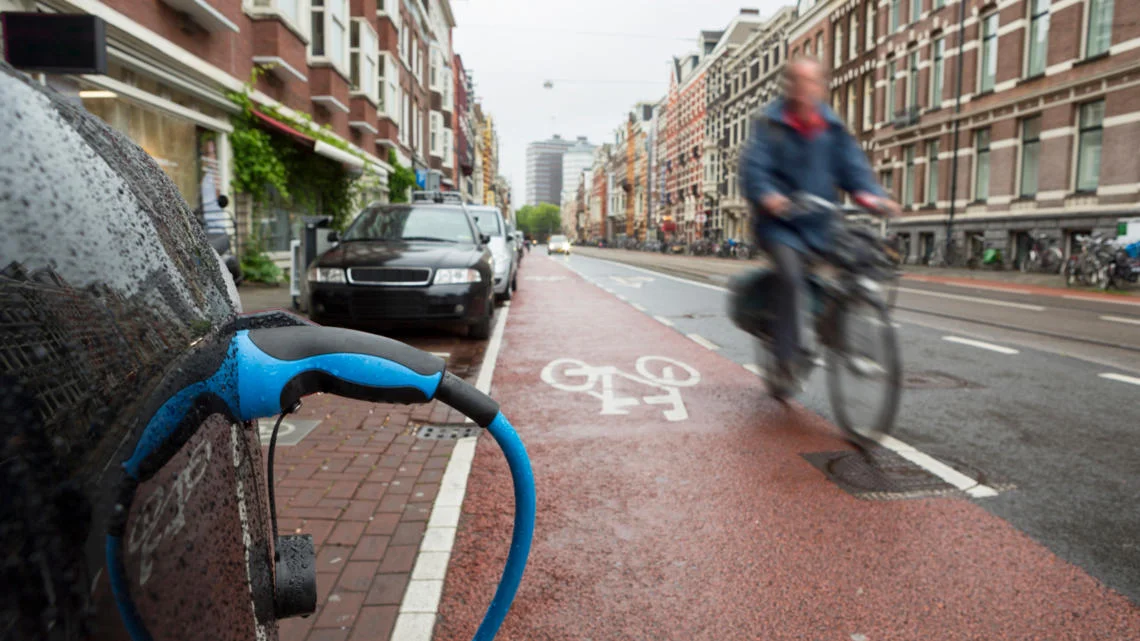22 September 2022 – Arcadis, in partnership with the World Business Council for Sustainable Development (WBCSD), has today released the Global Charging Infrastructure Market Report. Featuring 21 regions around the world, the report analyzes five critical parameters to determine how well prepared each region is when it comes to investing in infrastructure to enable the transition to electric vehicles (EVs).
The Netherlands consistently emerges as a leader when it comes to EV investments, alongside other high performers, including the UK and California in the US. Sharing well-defined strategies for EV infrastructure roll-out at both national and local levels, as well as strong tax incentives and a growing volume of public charge points, these frontrunners are all helping to set the tone for mass EV adoption.
As the global EV market continues to evolve, countries all around the world will need to continue ramping up their investment in charging infrastructure if they are to successfully transition to zero-emission vehicles. In the report, Arcadis and WBCSD have identified over 23 metrics across the five parameters. These are deemed to be the most influential when it comes to measuring a region’s market readiness for investment and have been used to determine what regions are doing well and where they could improve.
The five key parameters critical for supporting investment in EV infrastructure are:
1. Government leadership and incentives
Policy changes and stricter environmental regulations are some of the strongest catalysts for a global EV transition.
Hong Kong leads the way here, offering tax exemptions, an existing ban on ICE vehicles and penalty charges if driving in low emission zones without meeting the required standard. It also has a clear net zero declaration and a government budget for charging infrastructure incentives that is higher than 0.08% of GDP.
2. EV market maturity and readiness
A region needs to have a mature EV market to support viable investment in charging infrastructure. A mature market is characterized by vehicle affordability, availability of fit-for-purpose vehicles and ramped-up production capabilities.
Europe leads the way here, particularly Norway and the Netherlands. In contrast, many South American countries have room for improvement, such as Argentina, Chile and Mexico, which currently have less than a 2% market share of EVs.
3. Returns potential
Utilization rates are key to stable returns, and it is important to get the balance right between too much infrastructure and low utilization, and under-provided infrastructure versus too high utilization, which could potentially create “queues at the plug.” Returns potential is also affected by factors including electricity price, fossil fuel price, charging infrastructure capital expenditure and flexibility of other services that can be monetized.
Of the regions measured, China is the strongest in this area. Europe also performs well, particularly Spain, Norway and the Netherlands.
4. Charging infrastructure
The availability and accessibility of charge points are major factors in the transition to EVs. This means having access to reliable charging abilities at every point in the journey – at departure (street, garage or driveway), on the road, and at the destination.
The Netherlands leads the way here, but New York and California in the US also perform well in this category. Although the number of charge points is relatively low in both US states, they are set to benefit from a clear national strategy and have reliable power networks. However, New York, in particular, would benefit from increasing its ratio of forecast public charge points, which is currently as high as 16 vehicles or more per charge point, compared with California’s much stronger forecast ratio of 6-10 cars per public charge point.
5. Ease of doing business
Strong government leadership combined with a robust legal system and regulatory policies, and a strong GDP per capita, demonstrates the potential and attractiveness of investing in a region’s growing EV market.
The Netherlands, US and Singapore all top the table here.
Simon Swan, Global New Mobility Solutions Director at Arcadis, said: “The Electric Vehicle market is moving at a considerable pace, with new charging hubs and new technologies like wireless charging becoming available all the time. Accelerating this transition is critical for cutting emissions and limiting the impact of climate change, and it is encouraging that all regions included in this report are making progress towards mobility decarbonization, albeit at different speeds and with different focus areas.”
Thomas Deloison, Director, Mobility at WBCSD, added: “Widespread EV adoption is key, and even in the slower to develop markets, there is progress. This report is a snapshot in time, and regions will increase their scores as they adopt new government EV incentives, increase their EV charging infrastructure or as the EV market matures. With clear leadership and the right policy levers in place, electric vehicles can play a prominent role in tackling the climate crisis and improving the quality of life for all communities across the world.”
The Global Charging Infrastructure Market Report is an expansion of Arcadis’s earlier 2021 Global EV Catalyst Index. The newly updated report features additional regions, including Norway, Turkey, Hong Kong and South America, and expanded metrics, with the inclusion of the ‘ease of doing business’ and ‘returns potential’ categories.
The purpose of the report is to promote collaboration and foster regional dialogues between countries and organizations exploring the EV landscape. Together, Arcadis and WBCSD want to encourage collective action and are developing tools to help businesses, governments and financiers in creating bespoke strategies for deploying Zero Emission Vehicle technology.
The regions analyzed in the report include the Netherlands, UK, Germany, Norway, France, Ireland, Italy, Spain, Turkey, Canada, California, New York, China, Hong Kong, Singapore, Australia, Thailand, Chile, Brazil, Mexico and Argentina.
Sign up to receive a summary of the report here.
To learn more about our work on electric mobility, please reach out to Urska Skrt, Manager, Mobility Decarbonization.
WBCSD news articles and insights may be republished in accordance with the Creative Commons Attribution-NonCommercial-NoDerivatives 4.0 International Public License, and in accordance with our Privacy Policy. All Content must be featured with due credits.
